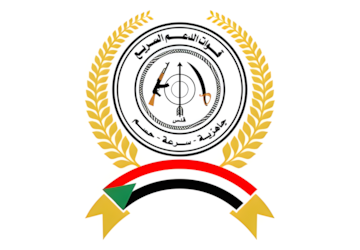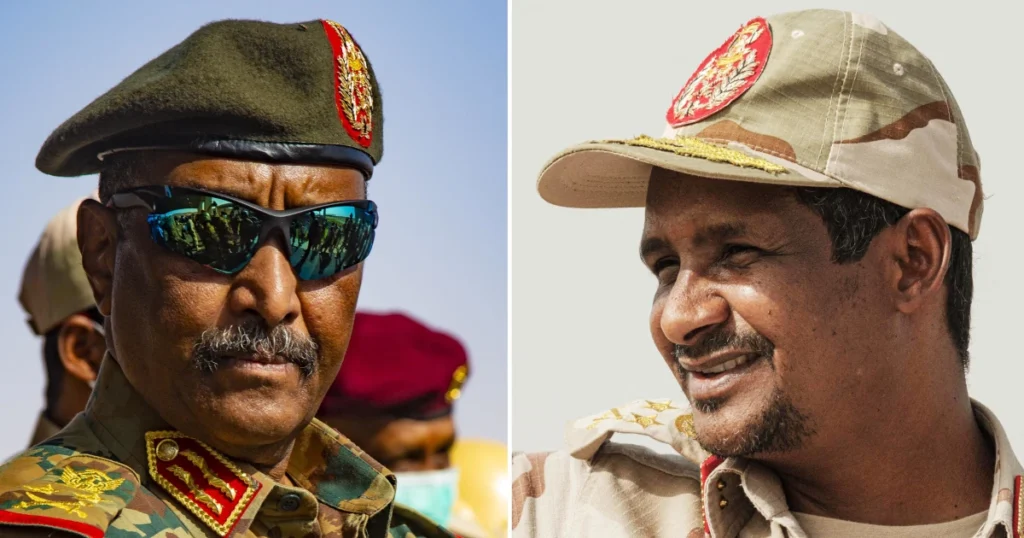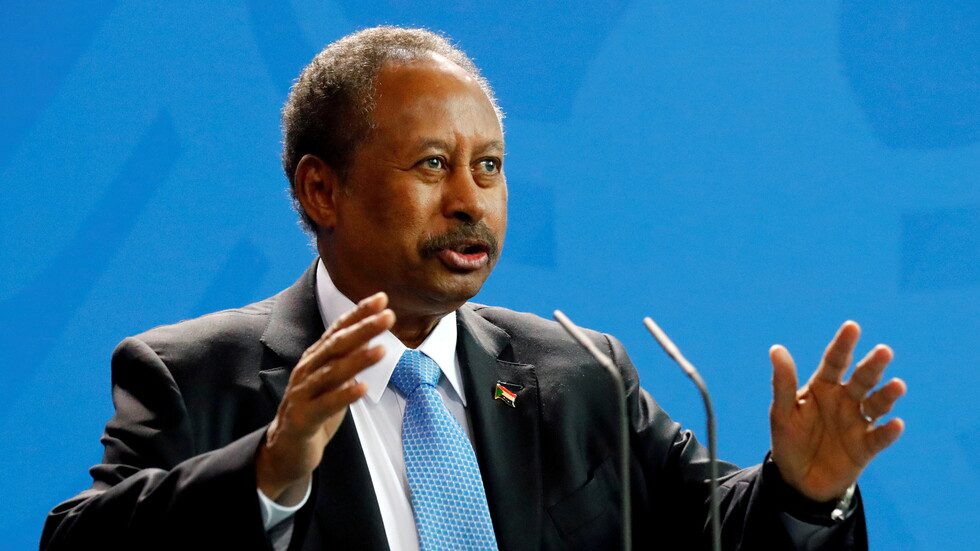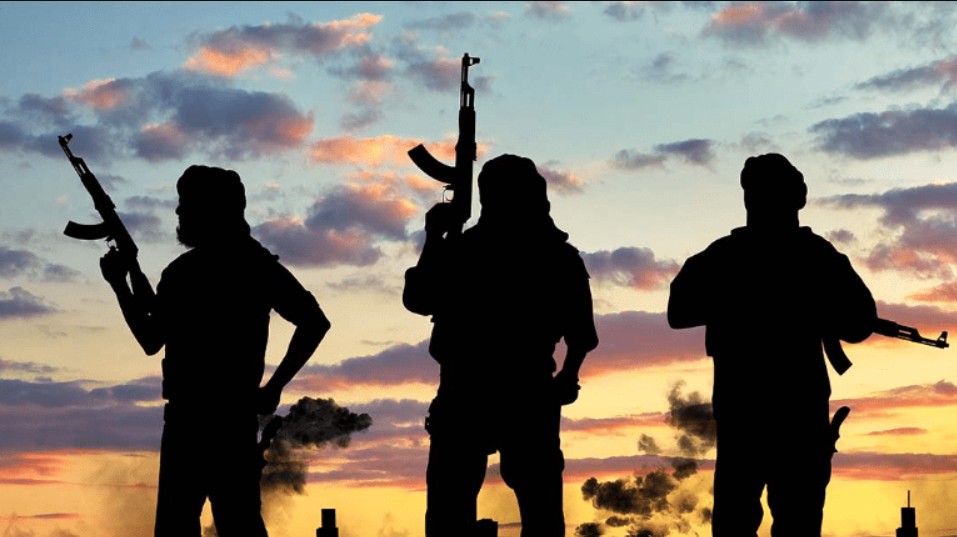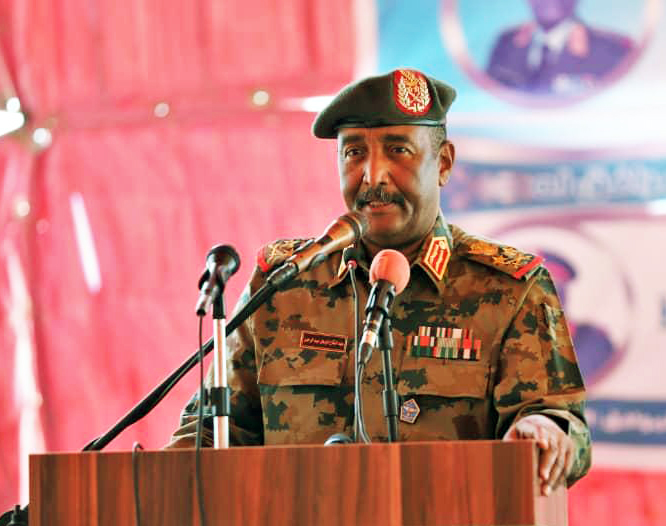
Sudanese still remember the day of October 25, 2021 as if it were yesterday – when General Abdel Fattah al-Burhan abruptly interrupted Sudan’s fragile path to democracy. He ousted the civilian transitional government, effectively dissolving state institutions and undoing the 2019 revolution almost overnight. He grandly proclaimed that elections would follow and the military would ‘return to the barracks’ after 2023, but those promises vanished like mirages in the desert.
Instead, we got fear and chaos. (Is this the Sudan we fought and died for?) All I see today is the yawning gap between his empty slogans and the wreckage he has left behind.
The civil war’s carnage
Worse, Burhan’s rule exploded into full-scale civil war in April 2023. His Sudanese Armed Forces (SAF) clashed with the Rapid Support Forces (RSF) – the powerful Darfur-origin armed group led by Gen. Mohamed “Hemedti” Dagalo – and within days Khartoum, Darfur and other regions were torn apart. Bridges were blown, airports closed, and Sudan’s fragile economy seized in an instant. The result has been staggering: tens of thousands killed and untold numbers wounded as humanitarians cry out that this is the worst crisis on record. The United Nations warns that more than 30 million Sudanese – half our country – now urgently need aid. Famine has been formally declared in at least five regions of Darfur and Kordofan. Every ceasefire agreement has collapsed within hours. One might ask sarcastically: was this war supposed to be “limited” or “surgical,” as a general once hinted?
The only outcome is a land smeared with tragedy – civilians hiding in basements instead of workplaces, children longing only for bread, and each truce negotiated by foreign mediators turning into yet another broken promise.
Institutions destroyed, complete collapse of state
Back home, basic institutions and services have crumbled. The war has destroyed our infrastructure: the World Health Organization verified at least 119 attacks on healthcare from April 2023 to October 2024, and over 80% of hospitals in conflict zones are now non-operational. Schools have shut down, government offices sit empty, electricity flickers by chance, and even the postal system barely functions. The World Bank reports Sudan’s GDP contracted by roughly 30% in 2023 and another 14% in 2024 – among the steepest drops anywhere – driven by the destruction of factories and Khartoum’s economic hub.
A local joke has it that Burhan’s economic strategy is “print, borrow, perish”; indeed, the Sudanese pound has lost about 50% of its value since the war began. With fuel and flour imports unaffordable and foreign reserves all but gone, even subsidies have vanished. The generation that boasted “break the empire” in 2019 now wakes up to empire-like shortages of medicine and power. (Did General Burhan honestly think he could arrest inflation with a radio speech?) One World Bank study notes that government revenues fell from 10% of GDP in 2022 to under 5% in 2024, pushing extreme poverty from 23% to 59% of Sudanese.
In short, he has inherited the ashes of our state.
Humanitarian hell
Meanwhile, millions of Sudanese have become refugees in their own land. The UN and NGOs agree: Sudan now hosts the world’s largest and fastest displacement crisis. Over 12 million people have been uprooted since April 2023 (about 25% of our population), and nearly 4 million have fled across borders. Before April 2023 we already had 15.8 million in need of aid; two more years of war has pushed that number to 30.4 million. Camps are overcrowded, rainy-season floods ruin tents, and a deadly cholera outbreak is spreading.
We have seen women and children risk cholera-laced water simply to survive. The IRC warns that 24 million Sudanese now face acute food insecurity – in some areas children are literally starving, victims of a war they never started. It is painful irony: the one who promised to liberate them from hunger (and dictatorship) has turned the country into an open-air prison of famine.
One aid director lamented that “more words can no longer capture the catastrophic toll” on Sudan’s 30 million souls – he’s right, for the suffering is beyond words or pen.
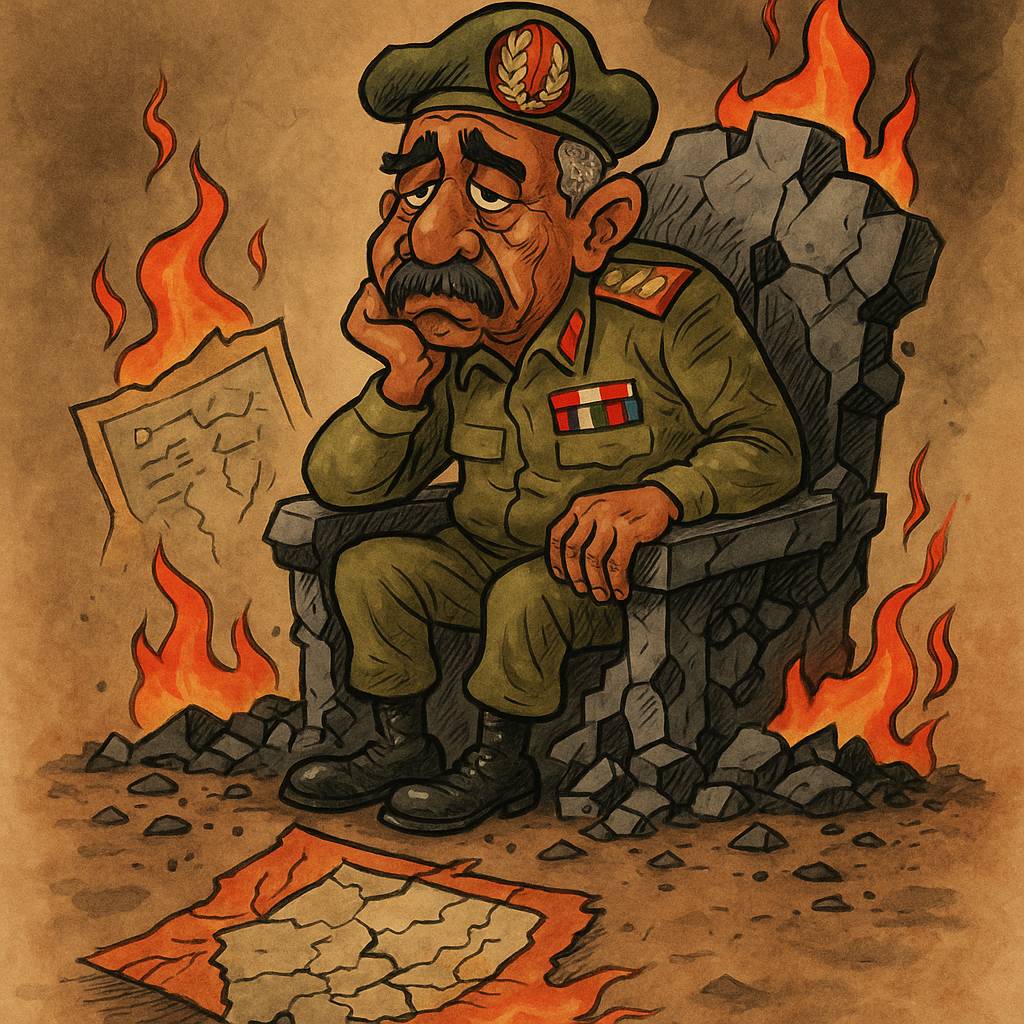
War crimes, sexual violence, apocalypse now
The brutality of this war is unbearable to watch. International observers (UN, Amnesty) have documented widespread atrocities. Various armed groups have systematically raped, abducted and mutilated civilians – women and girls as young as 12 have been gang-raped or kept in sexual slavery. RSF siege in places like El-Fasher have reduced whole communities to starvation, with aid convoys turned away. Meanwhile the SAF under Burhan has conducted indiscriminate airstrikes hitting schools, markets and hospitals in Khartoum, and Burhan’s forces have used starvation as a tactic.
No wonder the U.S. slapped sanctions on Burhan in 2025, explicitly citing his “blatant disregard of civilian lives” and even accusing his forces of war crimes. Port Sudan SAF junta controlled newspapers still run interviews where he professes concern for “stability,” but the world reads instead of infants corpses and witness accounts of rape. As one UN report flatly put it: these are not random incidents but deliberate strategies amounting to war crimes. And yet, even now, the despot shrugs.
Who will hold this regime to account, when it openly scorns international law?
On the economic front, Sudan under Burhan is in freefall. People used to joke that under Bashir we paid our salaries in sand, but now under Burhan they often get none. Before the October 2021 coup inflation was already sky-high; now it is hyperinflation. The World Bank says prices soared into triple digits, decelerating only slightly by mid-2025, meaning every loaf of bread or bag of sugar costs two or three times what it did just a year ago.
The gold-for-cash schemes he flaunted have dried up – by mid-2023 gold exports were virtually halted – and agriculture, our main livelihood, is crippled by war and flooded fields. Salaries and pensions have been devalued to dust: teachers, doctors and civil servants survive on handouts. If Burhan thought he could blame all of this on “global trends,” he forgot that no famine anywhere else is caused by Kuwait or the IMF. Even before war, Sudan ran headlong into debt distress; now our currency tumbling by 50%, we beg mercy from Gulf countries for just a grain of rice. (They send missiles instead.) In 2021 the World Bank warned that further printing would reignite crisis – but Burhan never got that memo.
Throughout all this, Burhan has laughed off or outright broken every political promise. He once claimed he would hold elections by 2023 and “exit politics” afterwards. Instead, he suspended the parliament and martial law is still in place. He even booted long-time Bashir loyalists back into government posts instead of purging them. On the diplomatic stage he tooled around with peace talks: Addis, Jeddah, Manama – he attended photo-ops but scuttled substance.
In May 2023 he signed a “Jeddah Declaration” under U.S.-Saudi auspices that vaguely promised safe aid corridors, yet no permanent ceasefire emerged. By late 2023 even his generals admitted war was the “only solution.” The U.S. Treasury recently explicitly noted that Burhan “refused to participate in international peace talks,” choosing conflict over compromise.
This tough guy pose sank any credibility left: when world powers set out roadmaps for Sudan’s peace, Burhan openly defied them. They’ve put him on global watchlists now. So I ask: was his ambition democracy, or personal rule by any means? The answer, tragically, is written in bullets and blood.
The battlefield itself testifies to his failures. Thanks to Burhan’s incompetence, the RSF now runs a state in parts of Darfur and South Khartoum. They even flaunt a “civilian government” in Nyala – a mirror of a stable administration, one Burhan pretends to lead. In many rural areas, neither the SAF nor the RSF govern; tribal militias and warlords fill power vacuums. The once-unified SAF is now a patchwork: Burhan had to issue sweeping decrees in 2025 just to reassemble disparate allied militias under his command. (He even reshuffled the air force chief, as if a new hire could fix Khartoum by morning.)
If Sudan is crumbling, it is on his watch.
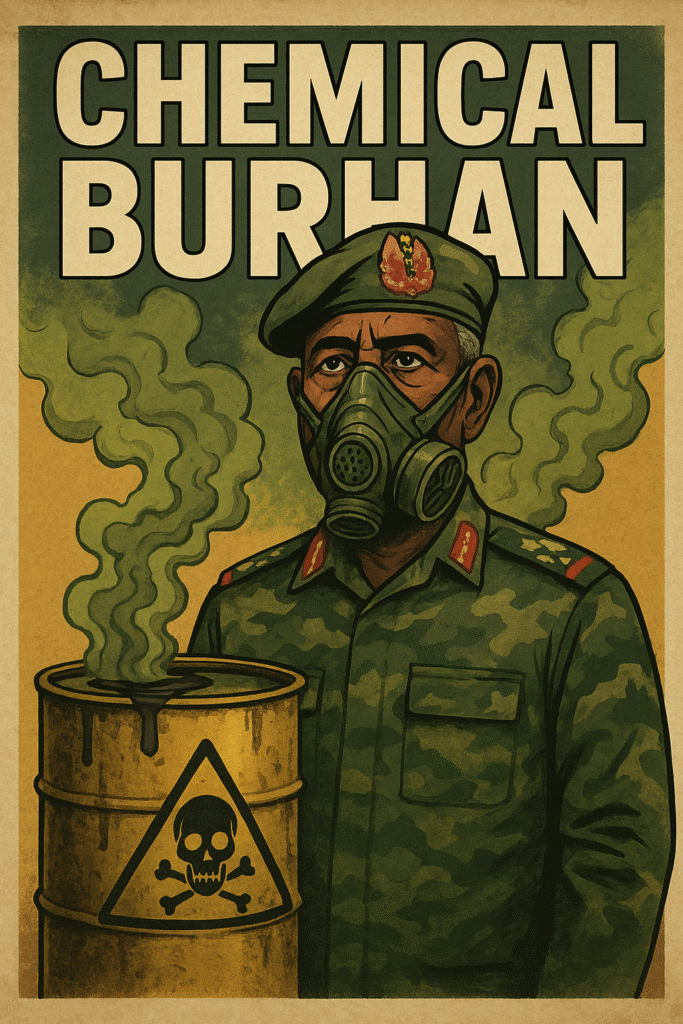
Diplomatic isolation and sanctions
Finally, Sudan’s foreign allies have mostly abandoned us. After the coup, $650 million in development aid was immediately frozen – World Bank grants and IMF loans suddenly went poof. The United States piled on a $700 million aid cut and paused $2 billion in planned grants. The African Union, the very body Burhan once lectured about unity, booted Sudan from its decisions. In 2024 even Washington publicly accused Burhan of using chemical weapons, then slapped new sanctions on Khartoum’s regime.
The UAE, an early backer of the transition, has clashed openly with Sudan’s generals – Burhan even broke diplomatic ties after they allegedly aided the RSF. Who now calls “Sudan” a “friend”? We’ve gone from a darling of donors in 2019 to an international pariah by 2025, all self-inflicted. Russian or Chinese promises can’t feed families or restore hospitals; at best they show in the papers.
Yet dear leader brags about them as if we’d be grateful for a few missiles to bury our cities with.
In the end, I circle back to the question: what has General al-Burhan really achieved in these four years? There are no triumphant photos to show, only headlines of despair. No bridges built, no peace won, not even a functioning bus route. Where are the schools, the clinics, the factories that a true leader would leave behind? All I see are graveyards, IDP camps and empty shops.
Sudan’s 2019 revolution promised “freedom, peace, justice,” but under Burhan we get none of that. We got war, misery, and more entrenched military rule – in ironic continuity with the very system we threw off. After four years of failure, the only answer I can offer is a question back to his generals: Do you truly believe this is the future Sudan deserves?
Author’s analysis is informed by reports from international observers and aid agencies documenting Sudan’s plight

